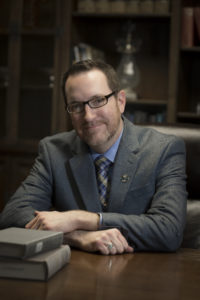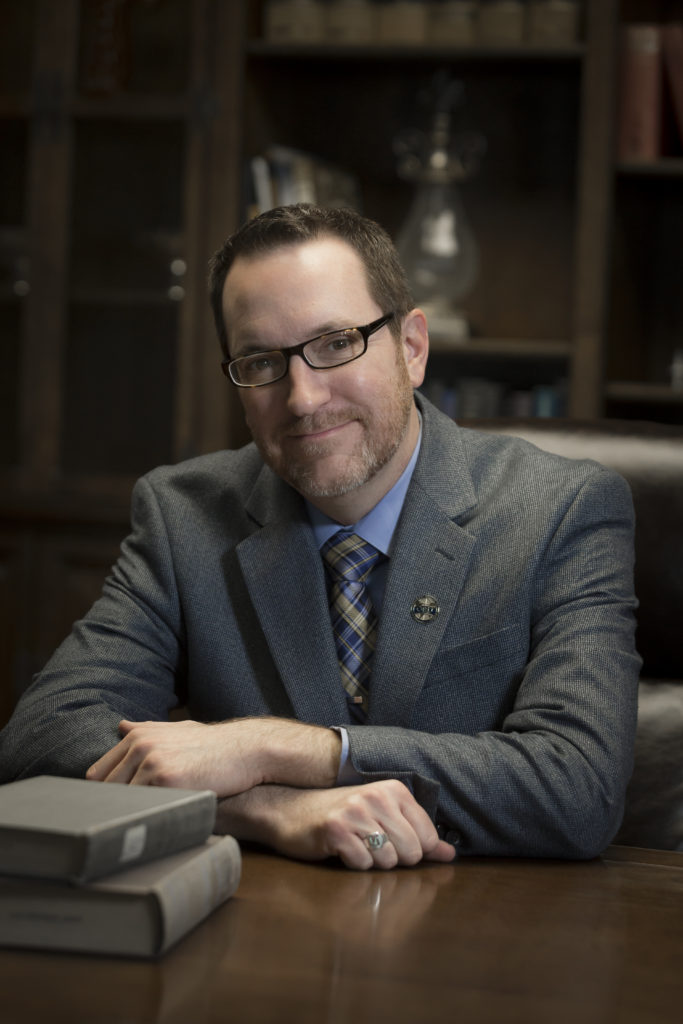Ep 58 Leadership with David Groves

Brad Post, Create the Movement, host
David Groves, GEB America, guest
Brad Post, Create the Movement, host: Welcome back to Create the Movement Podcast. This is your host Brad Post, and I’m excited to be with a longtime friend of mine, David Groves. He’s with GEB America. You guys are definitely doing a great job out of ORU here in Tulsa. How are you doing?
David Groves, GEB American Golden Eagle Broadcasting, guest: I’m good. Thank you, Brad, I appreciate you having me on the podcast.
BP: Absolutely, man. You and I have been friends since I was in Georgia. I think we connected on Twitter together.
DG: Yeah. Isn’t that amazing?
BP: It is.
DG: Bringing people together through social media. I think what was interesting was you and I had this huge amount of mutual friends.
BP: Yup.
DG: And it was pretty amazing that in all the years of what we’ve done that we hadn’t crossed paths. Although, we probably had at a conference and just didn’t know it, or something.
BP: Exactly. When I moved back to Tulsa we connected and met. I could say you mentored me, or I mentored you, or both? We met usually monthly and had coffee and talked about life and the transitions we were going through and all of that stuff.
DG: Yeah, exactly. Absolutely. I don’t take lightly those divine appointments that happen in life. I think think that at stages, I know like you said you were in transition, and at one point as was I. It was good to just connect and talk about challenges and whatnot.
BP: Absolutely. And making a difference together, too. Some of the stuff that we’ve done here in Tulsa has been exciting. You’ve done some exciting stuff. I’ve done some mediocre stuff, maybe? I could say.
[Laughter]
DG: No, you’ve done exciting things.
David’s Background
BP: Dave, I’d like to share your story. If you want to go back as far as you want.
DG: Sure, sure. It’s interesting. The media world, I’ve always had an interest in. I was thinking the other day, I remember being probably 10 years old, 9 years old, and going to a neighbor’s. We lived in a rural part of Ohio at the time – in the country. I remember going and visiting with some neighbors with my mom and siblings and they were having trouble with their TV. There was a new channel that had gone on the air and they couldn’t get it. I took the front of the TV apart; it was one of those console units that you had to move wheels. I remember like it was yesterday. I tuned it right in – crystal clear.
BP: Really? At age 10?
DG: They were amazed. And it wasn’t like I engineered it. It was just that they had a couple of things that weren’t correct and I did a little bit of tinkering. They let me do it and they were like, “Wow, can you get us the channel?” And it came right in.
It was always from that point that I realized that I had a propensity to do that. I remember being a kid and helping with the church. I remember living in rural Ohio we had a basement, and I remember my sister, brother and I set up a set with curtains. And we had a small camcorder and we scripted out a live-to-tape show because we didn’t have any editing capabilities, and made a program in our basement. They would play it back at our church for kids’ church and the kids love it.
BP: That’s awesome.
DG: We had puppets and music and we just did all kinds of things. I’ll give credit to my brother and sister; they’re very talented in both drama and music. We had this fun little thing we created. I was in my early teens and I remember running a broadcast camera for a church when I was maybe 13, 14 in like a practice training time. Just always enjoyed that part of it – enjoyed production, the organizing of it.
Years later, fast forwarding, my family had moved to the Tulsa area and I attended ORU. Went through the mass media/comm. arts program and was very involved in local radio for awhile. Along with some friends of mine. Co-hosted a broadcast for a number of years in the Tulsa area.
BP: I didn’t know that!
DG: Yeah, for about five years we had our own radio show. It was Christian alternative music back before the days of there being any internet streaming. There was no Pandora or Spotify. We still run into people that said, “Man, when I was a teen I used to go out in the garage and sit in my mom’s car and listen to your late-night program where you played those up-and-coming Christian alternative bands and whatnot.”
BP: That’s cool.
DG: I did that for a few years. Enjoyed radio, but always was involved in other forms of broadcast and media. And then, worked for several different ministries in a couple of different markets: in Texas, and in the Kansas City area, and then here in Tulsa. It’s just been something that I’ve loved and enjoyed and being a part of.
In the summer of last year, I had the opportunity to return here ORU and be a part of the TV network GEB. Loving being a part of that and what we do every day which is our brand which is ‘helping people live well.’
We have content and programming both that we create here and that we partner with ministries from around the globe to broadcast their messages and their ministries. We’re growing and we’re excited about the future.
BP: Would you have thought back when you were making TV shows for church that it wouldn’t be on a TV or a screen? It would be on your actual phone like live streaming and that type of stuff. It’s crazy. Or even on watches now.
DG: It’s pretty remarkable when you think about where things have come in just the last 25 years. I remember as a kid enjoying making videos and wishing there was a way to share it. I remember we had the best of intentions as kids. We would make videos and we were going to mail them to our cousins in other states. I don’t know if we ever did. I think my sister still has the videotape somewhere of our shows we would create for our cousins. There wasn’t a YouTube. There wasn’t an opportunity to make a video and send it via text or upload it to a Vimeo, or YouTube, or what have you. Unthinkable at the time. Pretty amazing.
Exciting Things Happening at GEB America
BP: You mentioned you guys are growing. You guys have added a lot of new things to GEB America. What would you say is some of the really exciting things that are happening in your business right now?
DG: We’ve been really blessed to grow and to have opportunity to grow. In the last year and a half to two years, we’ve added some new features. In spring of this year, we added an over-the-air affiliate in Orlando – Channel 55.3. We also launched on Apple TV with our own channel. We’ve upgraded both of our Android and iOS apps. We’re upgraded and created some new features and better functionality where people can watch us live from their phone. People can watch us from their mobile device as well on Roku and Apple TV.
So, giving people an opportunity on whatever platform or device they prefer to follow their favorite ministry or to be able to have that daily opportunity to hear a good, uplifting message or ministry word. They can do that. Whether it’s their computer, their laptop or they can certainly do that on a mobile device or one of the new set-top streaming opportunities.
I think that has been an excellent thing for us. We know that there are a group of people out there that are looking to ‘cut the cord’ as it’s called. We want to make sure that GEB America is present in the arena that they want to connect with us. Web-streaming has been big for us. Just in 2017, our web streaming has grown significantly. If you look at 2016, month comparison to month comparison, this year to last, in some cases we’ve more than doubled our live-streaming monthly.
So, people are connecting with us that way. We are, of course, available over the satellite on DirectTV channel 363, over the air in Tulsa on channel 53, and over a number of cable outlets in the Tulsa area: Cox Cable, NHG. We have over-the-air affiliates in San Jose and in Houston. We’re looking at some other opportunities in the future. We were hoping and reviewing some additional affiliates we would like to be able to bring to viewers in other markets.
We’re growing. It’s exciting. At the same time we know that there’s challenges within the industry because of how quickly technology changes. It’s really all about staying up to date and staying ahead of the curve the best you can. I spend a lot of time reading – a lot of time. Reading industry material, trades, and whatnot. And then, trying to stay connected with contemporaries, other networks, and other people in production and in media around the world. Just to make sure that we are doing our best to be on the cutting edge for what we do.
David on Time Management Skills
BP: On a personal level David, you mentioned you’re growing, you guys have a lot of stuff going. One thing I know you’re really good at is time management. How do you manage all of this? You’ve got a family. What are some of the tips you can give our listeners as far as time management?
DG: Well, I think that you have to be very intentional about it. You’re not going to be able to do it accidentally. One thing that I’ve learned, and I know it sounds very simplistic, but you have to be engaged on it. But the truth is if you don’t create a plan that works for you and stick to it, you won’t find that really good place in how to handle it.
What I mean by that is, for instance, I’ve read some great books by so many different people in this arena, that you come up with a good system. For instance, what are the things that are ‘time crunches’ for you? For me: emails. What do I do? Well, I set times throughout the day where I check email. I purposefully check email. It changes from day to day. But it might be first thing in the morning, then at another point before lunch, and then in the afternoon. Because there will be meetings in between those, there will be responsibilities in between those.
I think it’s important to set the time where you focus on, “Okay, I’m going to check my email and I’m going to make sure that I understand and reply. So, I can plan for those other meetings and those other interactions.”
BP: That’s great. Also, mentioning that, meaning that you’re present in your meetings. You’re not looking at your phone or looking at your email because you give yourself those times. You’re present and engaged. Right?
DG: And that’s one of the hardest things I think for people to do. And it was for me. I know a few companies that everybody puts their phone in the basket.
BP: Right, right.
DG: Or, puts it in another room. At least, we’re going to put the phone face down and focus on these agenda items. I think that those are good ideas. Another thing, from a time-management perspective, is you have to schedule and be reasonable with your schedule. I will tell you that I struggled with this for awhile in that I really tried to cram too much into a certain time frame. I would not say ‘no’ to that meeting, or say, “Hey, that’s really not going to work for me because I have a meeting at 1:00 and I have a meeting at 2:30 and I have somebody wanting a 2:00 meeting.” Well, the first meeting might run long. The second meeting is going to cause problems. What it creates is a level of stress that doesn’t help you at all be productive. The days come and go and maybe you do, or don’t, feel like you’ve accomplished a lot. That is important.
The other thing is I start my day early. I’m not a morning person, but I realize that for me I need to start earlier and prepare, think through the day. Sometimes, what helps me, because I tend to be a night owl, I will plan my day the night before. I’ll go through my schedule. There was a reason why when we we’re kids our moms laid our clothes out before school. Right?
BP: Exactly.
DG: Because mornings are hard. I’ll go as far as hanging out that tie and that dress shirt and thinking down to the simple thing of what pair of shoes am I going to wear. Because then the next morning I can start early focusing on what are the things that are going to transpire today. Because we all know meetings come up, things happen, they get thrown right into the middle of our schedule. So, what can we do to control things?
Years ago, I had a professor tell me you have to ‘plan your work and work your plan.’
BP: That’s good.
DG: I remember he would say it all the time. It’s kind of silly in a way when you hear, but when you really think about it you can’t just let things just happen. You can’t let it be accidental. So, I start early. Taking time to read devotion, prepare my day, really look through the schedule. I work very hard to do that so that I can not feel like I’m behind as soon as the day is started.
And so, time management is critical. When you look at some of the great thought leaders, some of the great, successful men and women in not just the media industry, just in business in general, they’re very intentional about that. Their focus – it’s important to have their focus on each individual moment, each individual meeting. If you find yourself thinking about the next meeting in the current meeting, then there’s probably some adjustments you need to make. It may be time management. It may be you’re not saying no to a few things and giving yourself the appropriate time to actually focus on the task at hand.
David on Leadership
BP: Absolutely. That’s good, good stuff Dave. Thank you. Just switching up, ending on the topic of leadership, what would you say is some of the best advice that you’ve ever received in the business realm? Going from ministry to work field. You’ve been through a lot, so I’d love to hear your thoughts on overall leadership.
DG: I’ve actually been reading a lot on leadership. I’m always looking for good articles and good books. I think that good leadership goes back to the thought-process of you’re not telling people what to, but a good leader is really leading the way. It’s very much a follow me, casting division – here’s where we’re going.
For me, some of the best leadership advice that I’ve got is that you have to be willing to not only work hard for where you want to be, but you have to take the time to really prepare yourself. You have to work on you and find the areas that maybe you are weak in and strengthen those. And that might be taking classes. That might be spending time with a mentor that’s been through maybe the same industry, maybe not. Maybe just been through a number of challenges and they can give you some sage advice.
I think the other thing, from a leadership perspective, is always being willing to listen and learn. I have met very few successful leaders that aren’t always trying to learn. I don’t think great leaders ever arrive, and I don’t think they ever are arrogant in thinking they have arrived. I think that always reading, always listening and trying to learn.
If you stay in a mode of learning, for me anyway, I feel like that place is where you really grow the most in your leadership style, your management style. Because there’s lots of managers, but a lot of them aren’t leaders. They’re more of an organizer of whatever – widgets, or people’s schedules, or programs. The good leaders, they care about people and they are always learning, and then they take the time to connect with the people they lead. People, if they trust and they have belief in the vision, they’ll follow a good leader.
I don’t know in your world and what you guys do and your background, how that corresponds to some of your thoughts on leadership. But that’s what I feel like is important to always be learning and always looking for an opportunity to be mentored. I think that just a good place to be. It’s a humble spot to be as well.
BP: Absolutely. Being coachable and trainable. You said listen and learn. I hear a lot of people saying, “I hear you.” Okay, you hear me, but you’re not listening to me. That’s great.
DG: I’ve had at least two different people I consider mentors that over the years have told me, “Hey, listen. Be a listener.” Which makes me think that maybe they thought at one point I wasn’t. You know? And so, even in a meeting I try to, and I don’t always do this well, but I try to take time to just listen before I start giving my interjection of, “Okay. Here’s how we should handle this.” Or, “Here’s my advice.” Give it a moment. Let people say what’s on their mind. Let them talk about the struggle or the challenge of the project or situation. And then, not be in a hurry.
That, right there, could be a whole other podcast. We’re always in such a hurry. You know? Whether it’s rushing from one thing to another, or one project to another, or one event to another. I feel like that rapid pace, we don’t take time to really slow down. I don’t know if you’re a fan of Simon Sinek, but I watched something he talked about once, and I’m not going to quote him because I don’t remember exactly what he said. But he was just talking about how we don’t take time to just be human. Sitting in that hallway waiting on the meeting where’s the conversation? Like, “Hey, how’s your dad?” Or, “How’s the family?” Not sitting there punching away at our phone. Talking. And saying, “Hey, I hear you moved to a new house. How do you like it? How do you like the neighborhood.” Just interacting – we forget that. I’ve not mastered that. I’m not going to say that I do that effectively and well because I know that I don’t.
But even just slowing down. I was at the grocery store the other day and I was in a hurry for something. I just felt like I needed to just put my phone in my pocket, focus on checking out. I had a nice, little conversation with the checker, “Hey, how’s your day?” “Oh, that’s good. Has it been a long shift?” “Yeah, it has been.” Have some interaction as humans.
Here at GEB our goal is to help people live well: spirit, mind, and body. Being an example of how we do that is really, truly caring about people and sharing God’s love in even just a tiny little way. With just a simple conversation with the guy at the gas station, or the person at the checkout. Slowing down. Not taking this approach of, “I got to go. I got to go. I got to go.”
BP: Being present.
DG: I think that we all have gotten wrapped up in our devices and the speed of doing business that it’s okay to slow down. Something here at GEB is we try to is every so many weeks we’ll have an all-team meeting where everybody just gets together. We might celebrate somebody’s birthday. Spend some time talking. Just, “Hey, what’s happening with you? Tell me about needs.” Just this week we sat and everybody was talking about their pets. And, of course, everybody loves if you’re a pet owner – you love your pet. Just having a conversation about nothing that really had to do with business for 10 minutes. Just to spend time and just be relatable. That’s something you’ll always have to work to – being present like you said.
BP: Absolutely. David, thank you so much for taking time to be on the podcast. Keep up the awesome work.
DG: I want to thank you for inviting me. Definitely a pleasure to chat with you and I wish you and all that you’re doing with Create the Movement the very best. And I hope that you guys are continuing to find great opportunities with the podcast. I think that it’s great.
BP: Awesome. Thanks, Dave.











